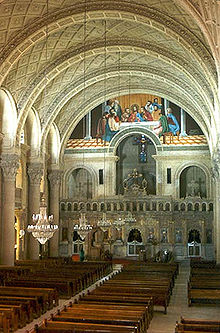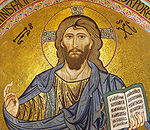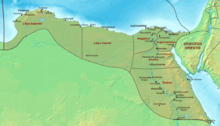- Christianity in Egypt
-
Christianity is a minority religion in Egypt. Egyptian Christians are known as Copts and account for about 10% of the population.[1][2][3][4][5][6][7][8][9][10][11] Despite the small proportion of Christians within Egypt, Egypt's Christian population is the largest in terms of absolute numbers in the greater region of the Middle East and North Africa. The history of Christianity in Egypt dates to the Roman era. Alexandria was an early center of Christianity, and from the 4th century until the Islamic conquest of Egypt in AD 640, Egypt was predominantly Christian.
Contents
Demographics
Over 95% of Egyptian Christians belong to the Coptic Orthodox Church of Alexandria,[8][9][12] an Oriental Orthodox Church. The Coptic Church constitute the largest Christian community in the Middle East[13] and has approximately 4 to 8 million followers in Egypt, in addition to 3 to 4 million abroad. The Coptic Orthodox Church is headed by the Pope of Alexandria and Patriarch of All Africa on the Holy See of Saint Mark, currently Pope Shenouda III. Affiliated sister churches are located in Armenia, Ethiopia, Eritrea, India, Lebanon and Syria.
Other native Egyptian Christians are adherents of the Coptic Catholic Church, the Coptic Evangelical Church and various Coptic Protestant denominations. Non-native Christian communities are largely found in the urban regions of Alexandria and Cairo, and are members of the Greek Orthodox Church of Alexandria, the Melkite Greek Catholic Church, the Armenian Apostolic Church, the Roman Catholic Church, the Episcopal Church in Jerusalem and the Middle East, the Maronite Church, the Armenian Catholic Church, the Chaldean Catholic Church, the Syriac Catholic Church, or the Syriac Orthodox Church.
Christian Denominations in Egypt by number of adherents
Christianity by Country
North AmericaSouth AmericaOceaniaDenomination Number of Egyptian adherents Coptic Orthodox Church of Alexandria 7,200,000 (9%) [8][9][14] Greek Orthodox Church of Alexandria 40,000 (0.5%)(4,500 are of Greek descent)[10] Coptic Catholic Church 161,000 (0.3%) Evangelical Church of Egypt (Synod of the Nile) 14,000 (out of 27,000 Protestants) [10] Assemblies of God 7,500 (out of 27,000 Protestants) Free Methodist 2,000 (out of 27,000 Protestants) Christian Brethren Church 1,500 (out of 27,000 Protestants) Anglican Church (Episcopal Church in Jerusalem and the Middle East) 1,000 - 1,500 (out of 27,000 Protestants) Melkite Greek Catholic Church 8,000 (0.1%) [10] Armenian Apostolic Church 8,000 (0.1%) [10] Roman Catholic Church 8,000 (0.1%) [10] Maronite Church 5,000 (0.1%)[10] Pentecostal Church of God 375 (out of 27,000 Protestants) Syriac Catholic Church 2000 (>0.1%) [10] Pentecostal Holiness Church 140 (out of 27,000 Protestants) Armenian Catholic Church 1,200 (>0.1%) [10] Church of God of Prophecy 110 (out of 27,000 Protestants) Seventh-day Adventist Church 852 [21] Chaldean Catholic Church 500 [10] Syriac Orthodox Church 450 - 500 History
Further information: Roman Egypt and History of the CoptsEgyptian Christians believe that the Patriarchate of Alexandria was founded by Mark the Evangelist around AD 33, but little is known about how Christianity entered Egypt. The historian Helmut Koester has suggested, with some evidence, that originally the Christians in Egypt were predominantly influenced by Gnosticism until the efforts of Demetrius of Alexandria gradually brought the beliefs of the majority into harmony with Nicene Christianity.
By AD 200 it is clear that Alexandria was one of the great Christian centres. The Christian apologists Clement of Alexandria and Origen both lived part or all of their lives in that city, where they wrote, taught, and debated.
With the Edict of Milan in 312, Constantine I ended the persecution of Christians. Over the course of the 4th century, paganism was suppressed and lost its following, as the poet Palladius bitterly noted. Graffiti at Philae in Upper Egypt proves worship of Isis persisted at its temples into the 5th century. Many Egyptian Jews also became Christians, but many others refused to do so, leaving them as the only sizable religious minority in a Christian country.
Alexandria became the centre of the first great schism in the Christian world, between the Arians, named for the Alexandrian priest Arius, and their opponents, represented by Athanasius, who became Archbishop of Alexandria in 326 after the First Council of Nicaea rejected Arius's views. The Arian controversy caused years of riots and rebellions throughout most of the fourth century. In the course of one of these, the great temple of Serapis, the stronghold of paganism, was destroyed. Athanasius was alternately expelled from Alexandria and reinstated as its Archbishop between five and seven times. Another religious development in Egypt was the monasticism of the Desert Fathers, who renounced the material world in order to live a life of poverty in devotion to the Church.
See also
- Religion in Egypt
- Coptic Orthodox Church
- Roman Catholicism in Egypt
- Protestants in Egypt
References
- ^ "Egypt from "The World Factbook"". American Central Intelligence Agency (CIA). September 4, 2008. https://www.cia.gov/library/publications/the-world-factbook/geos/eg.html.
- ^ a b "”The Copts and Their Political Implications in Egypt". Washington Institute for Near East Policy. October 25, 2005. http://www.washingtoninstitute.org/templateC05.php?CID=2386.
- ^ IPS News (retrieved 09-27-2008)
- ^ [1]. The Washington Post. "Estimates of the size of Egypt's Christian population vary from the low government figures of 6 to 7 million to the 12 million reported by some Christian leaders. The actual numbers may be in the 9 to 9.5 million range, out of an Egyptian population of more than 60 million." Retrieved 10-10-2008
- ^ [2]. The New York Times. Retrieved 10-10-2008.
- ^ [3] The Christian Post. Accessed 28 September 2008.
- ^ NLG Solutions <Online>. Egypt. Accessed 28 September 2008.
- ^ a b c "Egypt from "U.S. Department of State/Bureau of Near Eastern Affairs"". United States Department of State. September 30, 2008. http://www.state.gov/r/pa/ei/bgn/5309.htm.
- ^ a b c "Egypt from "Foreign and Commonwealth Office"". Foreign and Commonwealth Office -UK Ministry of Foreign Affairs. August 15, 2008. http://www.fco.gov.uk/en/about-the-fco/country-profiles/middle-east-north-africa/egypt.
- ^ a b c d e f g h i j "Egypt Religions & Peoples from "LOOKLEX Encyclopedia"". LookLex Ltd.. September 30, 2008. http://lexicorient.com/e.o/egypt_4.htm.
- ^ "Egypt from "msn encarta"". Encarta. September 30, 2008. Archived from the original on 2009-10-31. http://www.webcitation.org/5kwQyp3zM.
- ^ Who are the Christians in the Middle East?. Betty Jane Bailey. June 18, 2009. ISBN 9780802810205. http://books.google.com/books?id=xrGL7o69KBIC&pg=PA145&lpg=PA145&dq=coptic+orthodox&source=bl&ots=0ROIHZ4FFm&sig=DcEAaveJzQsCeS1tQK-liQc54cM&hl=en&ei=es46SqsUiP61A9ufrOUK&sa=X&oi=book_result&ct=result&resnum=1.
- ^ Cole, Ethan (July 8, 2008). "Egypt's Christian-Muslim Gap Growing Bigger". The Christian Post. http://www.christianpost.com/article/20080708/egypt-s-christian-muslim-gap-growing-bigger.htm. Retrieved 2008-10-02.
- ^ Tour Egypt. Feature Stories: Coptic Orthodox Christians. Accessed 10-13-2008.
- ^ http://www.cnewa.org/source-images/Roberson-eastcath-statistics/eastcatholic-stat07.pdf
- ^ CNEWA – The Coptic Catholic Church
- ^ "Controversy in Egypt after a prominent church figure declared the number of Copts in Egypt exceeds 12 million". November 2, 2008. http://www.alarabiya.net/articles/2008/08/28/55639.html.
- ^ "Pope Shenouda III declares to a TV station that the number of Copts in Egypt exceeds 12 million". October 29, 2008. http://www.unitedcopts.org/index.php?option=com_content&task=view&id=3073&Itemid=71.
- ^ http://www.cnewa.org/source-images/Roberson-eastcath-statistics/eastcatholic-stat07.pdf
- ^ CNEWA – The Coptic Catholic Church
- ^ Adventist Atlas
External links
Christianity in Africa Sovereign
states- Algeria
- Angola
- Benin
- Botswana
- Burkina Faso
- Burundi
- Cameroon
- Cape Verde
- Central African Republic
- Chad
- Comoros
- Democratic Republic of the Congo
- Republic of the Congo
- Côte d'Ivoire (Ivory Coast)
- Djibouti
- Egypt
- Equatorial Guinea
- Eritrea
- Ethiopia
- Gabon
- The Gambia
- Ghana
- Guinea
- Guinea-Bissau
- Kenya
- Lesotho
- Liberia
- Libya
- Madagascar
- Malawi
- Mali
- Mauritania
- Mauritius
- Morocco
- Mozambique
- Namibia
- Niger
- Nigeria
- Rwanda
- São Tomé and Príncipe
- Senegal
- Seychelles
- Sierra Leone
- Somalia
- South Africa
- South Sudan
- Sudan
- Swaziland
- Tanzania
- Togo
- Tunisia
- Uganda
- Zambia
- Zimbabwe
States with limited
recognition- Sahrawi Arab Democratic Republic
- Somaliland
Dependencies and
other territories- Canary Islands / Ceuta / Melilla / Plazas de soberanía (Spain)
- Madeira (Portugal)
- Mayotte / Réunion (France)
- Saint Helena / Ascension Island / Tristan da Cunha (United Kingdom)
- Western Sahara
Christianity in Asia Sovereign
states- Afghanistan
- Armenia
- Azerbaijan
- Bahrain
- Bangladesh
- Bhutan
- Brunei
- Burma (Myanmar)
- Cambodia
- People's Republic of China
- Cyprus
- East Timor (Timor-Leste)
- Egypt
- Georgia
- India
- Indonesia
- Iran
- Iraq
- Israel
- Japan
- Jordan
- Kazakhstan
- North Korea
- South Korea
- Kuwait
- Kyrgyzstan
- Laos
- Lebanon
- Malaysia
- Maldives
- Mongolia
- Nepal
- Oman
- Pakistan
- Philippines
- Qatar
- Russia
- Saudi Arabia
- Singapore
- Sri Lanka
- Syria
- Tajikistan
- Thailand
- Turkey
- Turkmenistan
- United Arab Emirates
- Uzbekistan
- Vietnam
- Yemen
States with limited
recognition- Abkhazia
- Nagorno-Karabakh
- Northern Cyprus
- Palestine
- Republic of China (Taiwan)
- South Ossetia
Dependencies and
other territories- Christmas Island
- Cocos (Keeling) Islands
- Hong Kong
- Macau
Wikimedia Foundation. 2010.



